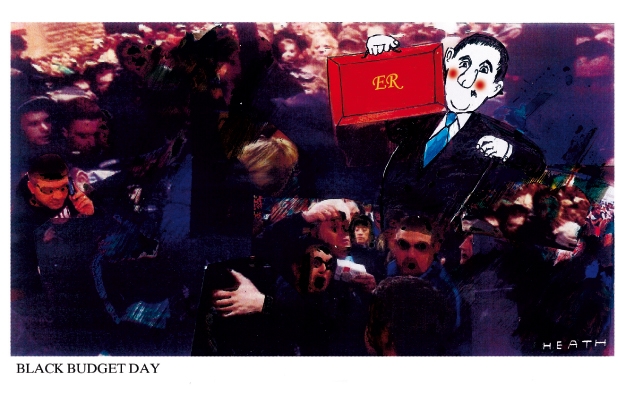Home
The government spent days announcing how the Autumn Statement would allocate funds. ‘Frontline’ parts of the National Health Service would get an extra £2 billion for the time being, £750 million of it diverted from elsewhere in the Department of Health budget. Another £1.1 billion from bankers’ fines would go to support GPs. Labour said it would give the NHS twice as much. Out of the £15 billion already set aside by the government for roads, a tunnel would be built for the A303 past Stonehenge. Of £2.3 billion (over six years) earmarked for flood prevention, only £4.3 million was set aside for the Somerset Levels, but £196 million for the Thames estuary. An intention to build 55,000 new homes a year until 2020 was announced, including a new garden city of 13,000 houses at Bicester, Oxfordshire. George Osborne, the Chancellor of the Exchequer, had to admit that he had missed the target announced in 2010 of eliminating the nation’s annual deficit by next April, since annual borrowing would hardly come in at less than last year’s £97.5 billion. But the Office for Budget Responsibility revised this year’s growth forecast from 2.7 to 3 per cent. Mr Osborne announced help for small businesses, a review of business rates and autonomy for Northern Ireland in setting its corporation tax.
Owen Paterson, a former cabinet minister, said that David Cameron, the Prime Minister, had been ‘sat on’ by Angela Merkel, the Chancellor of Germany, and made to drop any mention of curbing migration from the European Union in his much-awaited speech. Mr Cameron proposed that migrants should not qualify for benefits until they had worked in Britain for four years. He came nearest to mentioning withdrawal from the EU by saying that if ‘we cannot put our relationship with the EU on a better footing, then of course I rule nothing out’. Sir Chris Hohn, the son of a Jamaican car mechanic, agreed to pay his wife $530 million in a divorce settlement.
Andrew Mitchell, the former Conservative minister, was said to be contemplating the sale of a house to pay costs of £2 million after losing his libel case against the Sun, which had reported that he had called a policeman a pleb; the judge ruled that he probably had used the word, since the constable was ‘not the sort of man who would have had the wit, imagination or inclination’ to invent it. The A1 road was closed for a day as police searched for the cause of the sound of an explosion reported near Catterick barracks in North Yorkshire at 3 a.m., days after a big bang in Manchester at 10.30 p.m.
Abroad
Oil prices continued to fall and the rouble fell sensationally, one day losing more ground than at any time since 1998. Russia predicted a recession in 2015. Pro-EU parties narrowly won the Moldovan elections. Japan’s credit rating was degraded by Moody’s from A1 to Aa3. China refused to allow British MPs to visit Hong Kong and police clashed with protesters seeking democracy. The umpire at a cricket match in the Israeli city of Ashdod died after being hit by a ball, days after the death of the Australian cricketer Phillip Hughes at a match in Sydney.
Hundreds died as Boko Haram attempted to establish an Islamic state in north-eastern Nigeria. A million were reported to have fled their homes. Two suicide bombers killed 200 at the Grand Mosque in Kano, next to the palace of the Emir of Kano, who had called for armed resistance to Boko Haram. The Pope, during a visit to Turkey, called the bombing an ‘extremely serious sin against God’. In Kenya, al-Shabab killed 36 quarry workers in the north-eastern region of Mandera, near the Somali border. A wife and son of Abu Bakr al-Baghdadi, the leader of the Islamic State, were arrested by Lebanese security forces near the border with Syria. Iranian jets bombed Islamic State forces in eastern Iraq. An Egyptian court dismissed charges against Hosni Mubarak, aged 86, the former president, arising from deaths during protests that ended his rule in 2011. Bird flu killed three Egyptians.
In Switzerland, 74 per cent of those who voted in a referendum opposed a reduction in immigration from about 80,000 to 16,000 people a year. Nicolas Sarkozy, the former president of France, was elected head of the opposition UMP (Union pour un Mouvement Populaire). North Korea was blamed for a cyber-attack on Sony Pictures, before the release of a film about the North Korean ruler Kim Jong-un. CSH






Comments